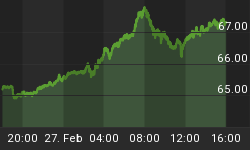The sad truth is that despite the best efforts of monetary economists everywhere, fundamental misconceptions about inflation remain entrenched in government, business, and the media.
In an exchange earlier this week on CNBC, a guest explained that rising oil prices can not cause inflation because prices for other goods must fall as spending is diverted to pay for more expensive oil. That explanation prompted host Becky Quick to ask: "If rising oil prices do not cause inflation, then what does?" Since that question was left unanswered on the air, I thought I would take the time to answer it here.
Inflation has only one cause and that is the Federal Reserve itself. In the United States, the supply of money and credit is regulated by the Fed. Since inflation is by definition an increase in the supply of money and credit, only the Fed can create it. If the money supply were held constant, increases in some prices would be offset by decreases in others. The result would be no overall inflation. In fact, without government created expansions of the money supply, the natural tendency of prices would be to decline as technology allowed for more efficient production of goods and services. So while most regard the Fed as the primary inflation fighter, in reality it is the sole inflation creator.
The main problem for consumers is that most inflation is not detected by the Fed's preferred measuring tools. As a result, inflation has been allowed to grow unchallenged.
For example, on Wednesday the government told us that consumer prices as measured by the CPI rose by only 2.8% over the past year. My estimate is that the actual rise was at least three times as great. The report showed that energy prices only rose by only 5.3%. Given that crude oil prices are up over 35% and heating oil prices are up 20% during that time period, how is it possible that energy prices are up only 5%? Are other energy costs falling to compensate -- firewood perhaps? The same CPI report claimed that medical costs rose by 4.6%. As a small business owner, I can't remember the last time my company's health insurance premiums rose less than 5% per year, and they typically rise at an annual rate of more than twice that. Perhaps the most incredulous of all the data in this week's CPI report is that food prices only rose by 4.5% during the past year. I don't know where the guys at the Bureau of Labor Statistics buy their groceries, but I'm spending at least 15% - 20% more for food this year than last. Wheat prices alone have practically doubled in the past year! The last time I checked, people tend to eat a lot of wheat. Does anyone really believe food prices are only up 4.5%?
As the U.S. dollar weakens, a few analysts are beginning to wonder whether we will now be "importing" inflation as the cost of imported goods rises to reflect the lower value of the dollar. Once again, Wall Street still doesn't get it. Our inflation problem is home grown. The reason the dollar is losing value in the first place is that we are creating too many of them. Since our biggest export is U.S. dollars, which foreign central banks have been foolishly monetizing, if anything it is our nation that exports its inflation to the rest of the world.
My guess is that right now inflation is already as bad as anything we experienced back in the 1970's. Some may argue that rising prices for food and energy are being offset by falling prices for such things as cell phones, iPods, digital cameras, plasma TV, etc. However, back in the 1970's, prices for similar items, such as television sets, clock radios, digital watches, calculators, etc. were also falling in price. However, despite such price declines, the more honest CPI yardsticks we used at that time still recorded double digit annual gains.
Still, the intoxicating effects that inflation has on nominal asset prices and GDP figures will eventually fade. When this happens Wall Street will sober up to the reality that the U.S. economy has actually been mired in recession for years, and that U.S. stocks have been in a stealth bear market all along. Priced in gold, euros, or Canadian dollars, (which are more accurate ways to adjust for inflation than phony government numbers) both the U.S. stock market and U.S. GDP have declined by approximately 58 %, 17 % and 21% respectively since January 2000. No wonder the government and Wall Street hang their hats on official inflation measures.
Like a student allowed to grade his own report card, he can ditch his classes, not do his homework, flunk his exams, yet still bring home straight A's. As long as Wall Street and the media continue to represent government inflation numbers as if they had any validity whatsoever, inflation is only going to get worse.
For a more in depth analysis of the tenuous position of the Americana economy and U.S. dollar denominated investments, read my new book "Crash Proof: How to Profit from the Coming Economic Collapse." Click here to order a copy today.
More importantly take action to protect your wealth and preserve your purchasing power before it's too late. Discover the best way to buy gold at www.goldyoucanfold.com, download my free research report on the powerful case for investing in foreign equities available at www.researchreportone.com, and subscribe to my free, on-line investment newsletter at http://www.europac.net/newsletter/newsletter.asp.















